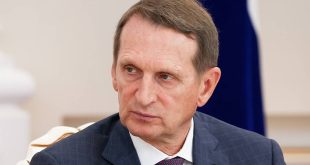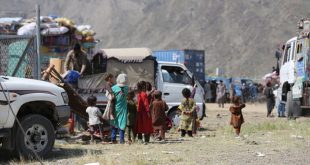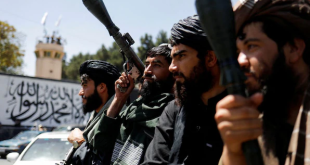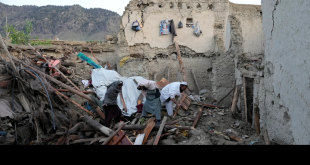KABUL: A presidential election that is days away in Afghanistan threatens the troubled nation’s best chance of making peace with the Taliban and ending 18 years of war, former President Hamid Karzai told The Associated Press on Tuesday, comparing the vote to asking a heart patient to run a marathon.
Karzai, still one of the most important political figures in Afghanistan, said a contested vote marked by violence could destabilize the country, warning that holding an election as scheduled Saturday “has all the potential and possibilities to lead the country further down to the abyss of crisis and insecurity and divisions.”
Previous elections in Afghanistan have been plagued by violence and allegations of corruption and massive fraud. The Taliban, with whom the U.S. abruptly ended yearlong peace talks this month, are opposed to elections and have threatened Afghans who go to the polls.
In a wide-ranging interview, Karzai laid out a roadmap for the nation, saying elections should only be held after Afghans have reached a peace deal and updated their constitution.
He called for an immediate resumption of peace talks not only between the United States and the Taliban, but also between the insurgent group and Afghan leaders, including those from the government who had been shut out of negotiations.
Karzai also said the U.S. should bring Russia and China into the peace process, noting that Russia has had success getting the Taliban and prominent Afghans to the same table. Last weekend, Taliban top negotiator Mullah Abdul Ghani Baradar was in China pressing for renewed talks.
“We should first come to peace in Afghanistan and then conduct elections,” he said at his heavily fortified residential compound in the center of Kabul. “We cannot conduct elections in a country that is going through a foreign-imposed conflict. We are in a war of foreign objectives and interests. It isn’t our conflict. We are only dying in it.”
His comments put him at odds with President Ashraf Ghani, who has pushed for elections Saturday.
Karzai said it would be better for Ghani to stay on as president, without an election, until Afghanistan finds its way out of an increasingly ferocious war. Then Afghans should approve any peace deal and constitutional changes in a traditional loya jirga, or grand council, he added.
Karzai said the killing of civilians must stop, blaming both the Taliban and U.S. and Afghan forces. Tens of thousands of Afghan troops and civilians have been killed since 2001, when a U.S.-led coalition drove from power Taliban leaders who sheltered al-Qaida militants as they plotted the Sept. 11 terror attacks.
He reserved some of his harshest words for the United States, citing recent strikes that killed civilians. Last week, an airstrike blamed on the U.S. killed 16 farmers harvesting fruit in the eastern Nangarhar province. On Monday, a raid by Afghan forces, with support from U.S. air power, killed 45 members of a wedding party in the southern Helmand province.
The U.S. military says it is investigating last week’s attack, while the Afghan defense ministry said forces in Helmand were targeting an al-Qaida cell operating in concert with the Taliban.
Karzai, who said he spoke with some of the victims of the Helmand attack, was furious.
“The way they are killing us, I don’t want them for a second in my country, not for a second,” referring to about 14,000 U.S. troops in Afghanistan. “I want the whole of them gone when they have no regard for our life, when they have no respect for the life of my children, when they kill our children so mercilessly.”
“The only way that the Americans can stay in Afghanistan is for them to respect our lives and the dignity of our lives and then ask the Afghan people if they will be allowed to stay,” he said.
Holding elections is a gamble, with others echoing Karzai’s warnings that a vote marred by violence and fraud allegations could trigger a political crisis and further disrupt chances of getting back to peace talks.
Supporters of the election argue that it can bestow the needed legitimacy on a new government to claim a place at the negotiating table. During peace talks over the past year, the Taliban refused to negotiate with the outgoing government, which Washington cobbled together after massive fraud in the last presidential vote five years ago.
Previous elections also were deeply flawed, and in the run-up to Saturday’s vote, candidates have alleged that Ghani is abusing his power by using government resources to help his campaign.
Until two weeks ago, it wasn’t certain there would be elections, as a peace deal between the United States and Taliban seemed imminent. In Kabul, only a few election posters were plastered on walls. Campaigning began in earnest 10 days ago.
While 18 candidates for president will be on the ballot, the majority are not campaigning, and some have thrown their support behind others, though none have officially withdrawn.
Security is a growing concern. Besides threats from the Taliban, many supporters of candidates are also heavily armed, adding to fears that a deeply contested election could result in violence.
The 2014 presidential election was so mired in fraud allegations that the United States decided a winner would not be declared and instead divided power between Ghani and his leading rival, Abdullah Abdullah to form a unity government. Abdullah is challenging Ghani again this time.
The repercussions of a messy election could create a political crisis, said Andrew Wilder, vice president of Asia Programs at the U.S. Institute of Peace. He also said discord could work against any chance at restarting the U.S.-led peace process with Taliban insurgents, who have traveled to Russia, Iran and China seeking support for renewed talks.
“A deeply flawed election, which seems quite likely, could provide the justification for many of the losers and their supporters to join forces to protest the results, resulting in a destabilizing political crisis,” Wilder said. “Unfortunately, just when the Afghan government and loyal opposition need to be getting organized and finding consensus to engage in a peace process with the Taliban, the presidential elections could well have the opposite effect.”
 Afghanistan Times
Afghanistan Times




